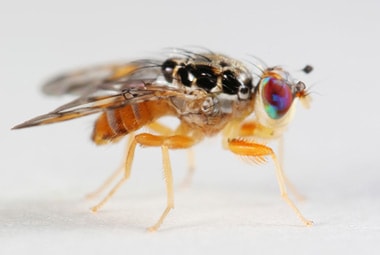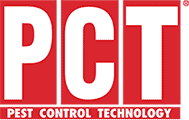
Fruit flies are a type of nuisance pest that are found living worldwide- laying their eggs on ripe, decaying, or fermenting foods. These pests become very abundant in the fall or harvest season and can become a huge annoyance in homes, restaurants, grocery stores, and food processing facilities.
| Pest Identification | |
|---|---|
| Recognition | As their name suggests, small fruit flies are small in size. Adults only grow to be about 1/8th of an inch in length. Small fruit flies typically have red eyes, though some can have brownish or black colored eyes. Their bodies are usually black on top and gray on their underside, but to the human eye they can appear tan. Their wings are translucent. Small fruit fly larvae are about 1/4 to 3/8 of an inch long. They are worm-like in appearance, and their head is tapered at the head end of their body and rounded at the hind-end segment. The larvae are white except for the two dark colored mouth hooks. |
| Biology | Female small fruit flies will lay their eggs (about 500) on the surface of decaying or fermenting fruits, vegetables, or in the liquid at the top of improperly sealed jars or cans. The eggs then hatch in about 30 days, and the larvae will feed on the liquid that they hatch in. Five or six days later, the larvae pupate after crawling to a drier location. After two days, they emerge as adults and are ready to begin mating and continuing the life cycle. The small fruit fly has a very short life cycle of about 8-10 days in the proper temperature (85 degrees). This means that a small problem with fruit flies can quickly become a very large problem. Small fruit flies are capable of spreading a variety of pathogens and bacteria that they pick up on their body and legs as they travel. They will spread the bacteria on food and contaminate food prep areas that are located in your home. |
| Habits | Small fruit flies build their numbers all spring and summer and reach their peak in the fall when the farmers are harvesting their crops, giving these pests plenty of food and breeding sites. Small fruit flies often enter homes through produce and other food items that are already infested with fruit flies or their larvae. They will also enter homes, commercial kitchens as well as other commercial facilities through spaces found in screens, doors, and windows. They are particularly attracted to properties that have vegetable gardens, fruit trees, and compost piles. |
| Prevention | Because of the sheer numbers of fruit flies found living throughout the environment, it is difficult to stop a fruit fly infestation in your home; however, there are some things you can do to help deter and stop them from getting into your house. Make sure to inspect fruits and veggies for signs of fruit flies before bringing them home from the grocery store or farmers market. Quickly get rid of overripe fruits and vegetables and store produce in the fridge instead of out on counters. If gardens are located on your property, immediately pick up any fallen fruits or vegetables and place them a distance away from the exterior of your home. Inside of your home, routinely remove trash and place it outside in containers with tight-fitting lids until trash day. Regularly wash out and disinfect trash cans. Wash dirty dishes every night and make sure that sinks and drains are free of debris. Also, make sure to fix or replace leaky or drippy fixtures or faucets. |
| Professional | The most effective way to control small fruit flies is by contacting a pest control company. At Rottler’s Pest & Lawn Solutions, we offer relief for fruit flies and other types of flying insects that infest homes and businesses in St. Louis and Mid-Missouri. Treatments for small fruit flies may include the use of appropriately labeled botanical, microbial, and/or enzymatic insecticides and insect growth regulators in floor drains, wastewater traps, and other breeding sites along with the installation of insect light traps. If you’re ready to get rid of small fruit flies, give us a yell! |

